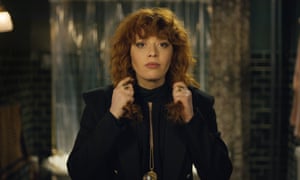Netflix’s Russian Doll: TV’s answer to Groundhog Day?
In this brilliant new series, Natasha Lyonne plays a woman whose life, or rather death, is on repeat
In Russian Doll (Netflix, out now), Natasha Lyonne’s Nadia – a chain-smoking New Yorker with corkscrew hair and a don’t-fuck-with-me demeanour – is marooned in a time loop, destined to die and be catapulted back to the bathroom at her birthday party over and over again. Nadia, whose fondness for chemical stimulants makes William Burroughs look like a rank amateur, initially assumes she is on some massive hallucinatory comedown, but slowly it dawns that she’s in a never-ending nightmare.
Naturally, we have been here before (geddit?), most famously in Groundhog Day, in which Bill Murray’s cynical weatherman, Phil, keeps reliving the same day in snowy Punxsutawney. It’s a brave, or possibly foolish, writing team that try to hold their own next to Harold Ramis’s classic. But if anyone is up to the task it’s Russian Doll’s stone-cold brilliant creators Lyonne, Amy Poehler and Leslye Headland, who tip their hats to Ramis and co in their deployment of Harry Nilsson’s Gotta Get Up in place of I Got You, Babe by Sonny & Cher, signalling that the clock has reset and Nadia is back where she started.
Unlike Groundhog Day, though, this is not an unfolding tale of redemption. Yes, you could say that Nadia, a 36-year-old kidult who ducks out of work meetings to visit her drug dealer, is a disaster zone worthy of a dedicated UN task force. But Russian Doll is not about showing its protagonist the error of her ways. Instead, having watched Nadia go through the five stages of grief, we find her on a quest to discover what the hell has happened and how she can make it stop. Is she having a psychotic episode, like those experienced by her late mother? Is the building where she has her party haunted? If so, is she an actual ghost?
One of the many virtuoso gags here is that, despite the endless repetition of her birthday bash, the manner of her deaths – which include being mown down by a taxi, tumbling into a beer cellar or plunging to her death in a faulty lift – are a surprise to her every time. It’s no wonder, after breaking her neck in her friend Maxine’s stairwell on three occasions, that she starts using the fire escape instead.
But the greatest joy of Russian Doll is Lyonne herself, who pulls off a smart balance of poignance and slapstick. Lyonne is best known for her role as Nicky, the drug-addled trust-fund babe in Orange Is the New Black, and there are clear overlaps in Nadia’s knee-jerk wisecracking and faux bravado. But here she is clever yet scatty, self-destructive but resilient. We see her holding down a job – although who needs a 9-to-5 when you’re going to die in the next 24 hours? – and capable of compassion, such as when she visits the homeless shelter to stand guard over a man’s boots, which, in one of her previous life cycles, were stolen while he slept.
It is traditional for time-loop dramas to deliver a heart-warming message to hanky-clutching viewers that they should do better, be better and make every day matter. Gloriously, Russian Doll has no time for such finger-wagging. As Nadia wisely tells Maxine: “I got bigger fish to fry … I gotta work out how to get down the stairs.”























